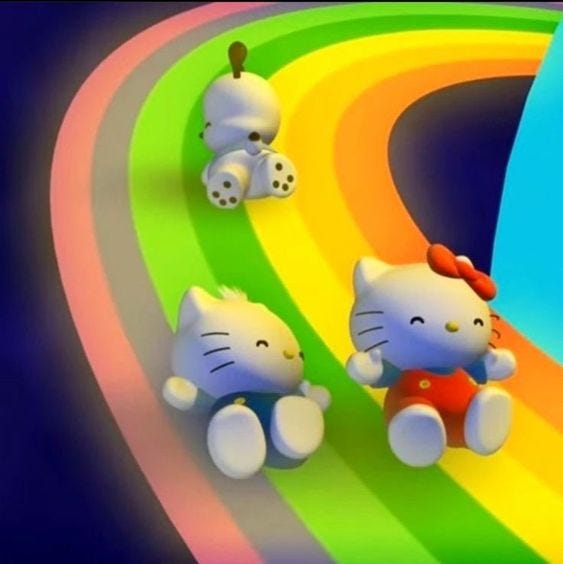People speak a lot about the early twenties and the late twenties and the contrast between the two ages. Yet I rarely hear anyone talk about the mid-twenties.
Some say it’s the hardest age, I say we’re the forgotten age, too young to be taken seriously and too old to feign naivety.
It’s a weird time for sure.
Half of the twenty-somethings I know are settling down in their nests and preparing to start families. Meanwhile, the other half still feel like adult babies at times, stuck in the same time loops. We want to spread our wings and fly, but every attempt seems to leave us alone on the cold, hard ground.
Why is that? Where does this sense of adulthood come from? Why do so many of us still only feel half-grown?
It could be that the traditional rites of passage that marked adulthood are no longer applicable or even feasible for us.
What is adulthood traditionally — 5 Milestones
Traditionally, sociologists define the “transition to adulthood” by five milestones: completing school, leaving home, becoming financially independent, getting married, and having a child.
Traditional markers of adulthood are no longer as easy or desirable as before. Extended education, piling debts, and rising living costs have delayed these milestones and muddled the path, leaving many young people feeling uncertain about their transition to adulthood. Many also no longer feel the desire to complete all milestones, like getting married and having kids.
The New York Times reported that many people in their 20s move to a new place every year, move back in with their parents at least once, change jobs seven times on average, and marry later than ever.
We are experiencing a major shift in adulthood's timeline and it’s time to redefine adulthood and move beyond conventional roles.
Infantilization and the rise of adult babies?
As the path to adulthood is delayed, are we seeing a trend of adults reverting to childhood? According to articles on Dazed and Real Life Mag, the rise of "cuteness" as an aesthetic, and the infantilization of adults through apps and advertising could be contributing factors to the rise of adult babies.
Infantilization is treating someone who is not a child as if they are, and studies show that it is generally perceived as disrespectful. However, some companies intentionally use this as a marketing tactic, knowing that "when adults act like kids, you can take their money like candy" (Real Life Mag). Similarly, Dazed asserts, “Make no mistake: the capitalist elites want you to think of yourself as a silly little goose”.
Psychoanalyst Josh Cohen explains that self-infantilization can be a way to feel in control of one's own helplessness. But by handing over our power, we only become more dependent and incapable. While enjoying cute or childlike things is not problematic (let’s be real who doesn’t love hello kitty and friends), we must be careful not to lose our agency.
So how do we go about becoming capable humans in a way that doesn’t conform to conventional roles and doesn’t leave us feeling like an adult baby?
Redefining adulthood: the fully functioning person
In my first psychology class, I learned about the concept of the fully functioning person. According to Carl Rogers, one of the founders of humanistic psychology, this person is self-aware, self-regulated, and able to function effectively in their environment. They have a clear sense of identity, are open to new experiences, and have healthy relationships with others. They regulate their emotions and have a sense of purpose.
Rogers believed that humans have a basic motive, to fulfill their potential and achieve the highest level of “human-beingness” they can. This is known as self-actualization. A fully functioning person continually works towards becoming self-actualized and embraces “existential living,” which means living fully in the present moment. Such individuals experience a sense of inner freedom and actively embrace creativity, excitement, and challenge.
How do we become fully functioning individuals? The answer begins in our childhood.
Children need positive regard from others and self-worth. Self-worth develops through interactions with parents and others. High self-worth leads to positive feelings, confidence, and openness to challenges, while low self-worth leads to avoidance and guardedness. Rogers believes that unconditional positive regard — accepting and loving someone for who they are, even when they make mistakes — is necessary for children to feel valued, respected, and loved. Conditional positive regard, where parents only show positive regard, praise, and approval when the child meets their expectations, can hinder a child’s self-worth.
Like a flower, a nurturing environment encourages growth, while a harsh one constrains it. Similarly, the conditions of an individual’s environment either facilitate or hinder self-actualization.
Even if your childhood lacked acceptance and positive regard, you can work towards self-actualizing by cultivating acceptance, self-worth and the characteristics of a fully functioning person.
5 Characteristics of a fully functioning person:
Openness: Embracing both positive and negative emotions without relying on ego defence mechanisms.
Existential living: Fully appreciating the present moment without dwelling on the past or future.
Trusting feelings: Paying attention to and trusting one’s own feelings, instincts, and gut reactions.
Creativity: Incorporating creative thinking and risk-taking into one’s life, seeking new experiences.
Fulfillment: Being happy and satisfied with life, and constantly seeking new challenges.
Fully functioning people are well-adjusted, balanced, and interesting individuals who often achieve high status in society. According to Rogers, the fully functioning person is a process of continuous growth and change, rather than a final destination in life.
Conclusion
The 5 characteristics mentioned above are more abstract than the 5 milestones of adulthood. However, this allows for inclusion and growth, as not everyone wants to follow the traditional path of going to university, getting married, or having a child. Pursuing the ideal of becoming a fully functioning adult through self-actualization, being open to new experiences, living in the present, trusting ourselves, living creatively, and finding fulfillment in life, can lead to personal growth and understanding, making life much more fulfilling.
This process removes the pressure of hitting milestones ‘on time’, or staying a child forever because the world leaves us feeling powerless. If we build a strong enough internal world and let that pour into our surroundings, we can actively grow and create a better life for ourselves.
Furthermore, by working on accepting and loving others for who they are, without conditions or judgment, we can help them build their self-worth and reach their own goals of self-actualization.
This doesn’t mean tolerating disrespect, degradation, or abuse, as having a strong sense of self-worth doesn’t allow for that. Rather, it means accepting our own imperfections and unlovable traits, while recognizing that we are still lovable for the sum of who we are, not just the good parts.
Navigating adulthood is a unique experience for everyone, but it’s a significant part of the shared human experience.
If you’re having a hard time in your 20s, just know that many people including me can relate to facing similar struggles.
Discussion
Have you struggled to feel like an adult in your 20s? How would you redefine adulthood? Is self-actualization a priority in your life? Leave a comment or reply to this email to continue the discussion.









